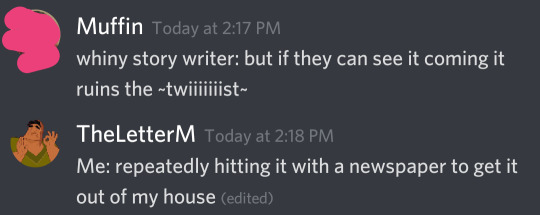Note
How do you know when your writing is “good” in the most objective way possible? Is it even possible?
How To Improve Your Writing

I can say with the utmost confidence that there is absolutely no way to determine whether a piece of writing is without a doubt “good” or “bad.”
Writing is an art form and is entirely subjective, changing from person to person and from interpretation to interpretation. Even some of the best classics have their critics, and a subject or style that may be riveting to one person may be boring to another.
Writing tastes even change within a single person; a book you used to love as a kid can become unreadable as you grow older, and your preferences for certain genres and tropes also tend to change as well.
You yourself can never determine whether your writing is “good” or “bad” because often times you tend to be your own worst critic when it comes to what you’ve written.
Instead of worrying about the completely subjective and unattainable concept of “good” writing, think of it more along the lines of a learning curve. Consider yourself a student of writing who’s constantly working toward improvement the more they practice.
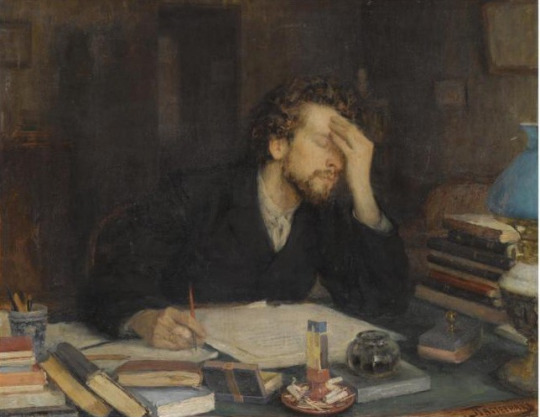
Every time you sit down to write—or even to some extent, when you read—you become more experienced, and with experience there comes a certain knack for grammar, spelling, and flow.
Your writing improves as you practice, and because improvement is constant and never-ending (there is no such thing as becoming the Ultimate Writing God wherein it is impossible to get better) there is no way to determine how far along you need to be in order to be considered a “good” writer.
There is such thing as amateur writing, where the author struggles with spelling, grammar, and paragraph spacing, but without a doubt within their narrative there is a part that shines.
Whether it be the characters, the storyline, or a certain snippet that really hits the jackpot, there is bound to be a supposed “good” aspect among the “bad.” Therefore, to label the entire work as bad would be false, because no work of art is entirely good or entirely bad.
Things you can do to grow more experienced in your writing

Practice Writing a Lot!
Writing is a muscle that needs to be exercised, and if you stop writing because you’re afraid of it being labeled “bad” then you’ll never be able to continue on your journey of improvement!
Reading: A Lesson From Those More Experienced Than You
Published authors more often than not had to work for years in order to get to where they are now, especially if they’re traditionally published and needed to go through the process of querying to get there.
Because they’ve worked for so long, you will learn from their writing. You will learn new metaphors, new tropes, new character archetypes, new ways to describe things, new ways to structure scenes and dialogues and descriptions, even if you don’t realize it!
Get a writing buddy!
Having a friend you can exchange writing with can be a great help, especially since a fresh set of eyes can pick out grammatical errors or narrative inconsistencies that you might not have noticed. You learn from each other and help each other with your specific strengths and weaknesses.
For example, if your writing buddy is better at dialogue and you’re better at descriptions, you can help one another out by sharing your own experience.
Look up writing tips and tricks, just like how you’re doing now!
Writing advice blogs like me are always here to help. Whether it be videos on YouTube, blogs on Tumblr, or published authors sharing their experience, it’s super easy to find some awesome content online.
If you need help, you can check out my FAQ, or if you want you can follow these amazing writing blogs that are always a fantastic help!
@heywriters
Fantastic writing advice blog who answers asks and reblogs awesome writing content!
@writing-prompt-s
A ton of unique writing prompts to help get the gears turning!
@writingwithcolor
Helps you develop your POC characters!
@scriptmedic
This blog is non-active but still has a ton of masterposts about how to write injuries!
@jennamoreci
A self-published author who has amazing writing advice videos posted on both her Tumblr and her YouTube channel. Has helped me so many times when I’m in a bind.
I hoped this helped, best of luck!
435 notes
·
View notes
Text
I AM BEGGING YOU TO HELP SAVE DUSTIN HIGGS
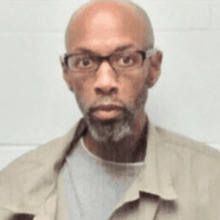
Dustin Higgs is a Maryland based artist on Death Row for a crime he did not commit -
He was convicted and sentenced to the federal death penalty as an accomplice to the 1996 murders of Tanji Jackson, Tamika Black and Mishann Chinn. It was the first federal death sentence handed down in Maryland in the modern era.
Dustin was not the person who actually shot the three women. In fact, it was Willis Haynes who pulled the trigger, and he was sentenced to life in prison plus 45 years after a separate jury spared him the death penalty for the crime. With the resumption of federal executions in 2020, Dustin's life is at serious risk.
He is sentenced to be excecuted on Jan 15. 2021. 3 days before MLK Day and just 5 DAYS BEFORE THE NEW FEDERAL ADMINISTRATION IS PUT IN PLACE
Please if you have just one second or one spec of human decency, click these links.
37K notes
·
View notes
Text
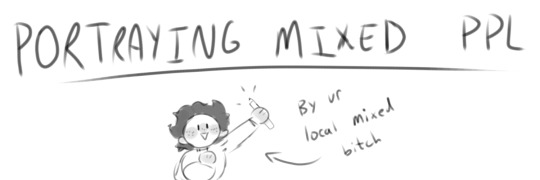
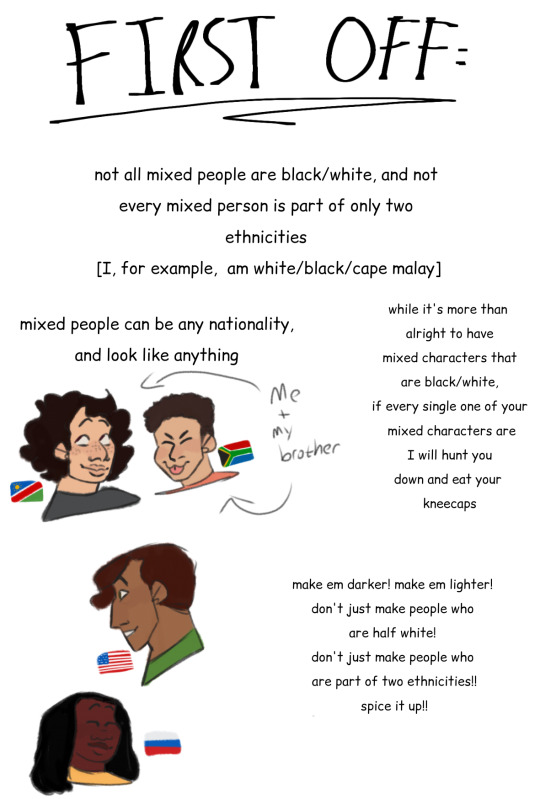



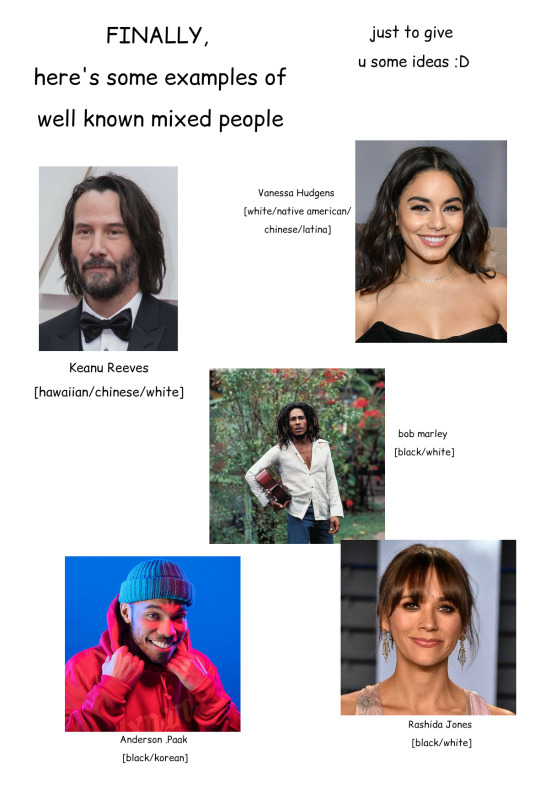

Hi there this is a psa by your local mixed kid
Mixed rep in the media as a whole is kinda a fucking disaster so I'm definitely encouraging people to write more diverse mixed race characters!!! That being said give this handy dandy little guide a read to make sure you have a basic idea of what you're doing. And also. Y'know. Maybe dont make your mixed characters nonhuman. Just a thought
43K notes
·
View notes
Text
How to Keep an Edit Notebook
In my How to Edit a First Draft post, I mentioned something I call an edit notebook. Edit notebooks help you figure out what level of revisions your WIP requires, and exactly what is wrong with your manuscript. I use a 3-subject notebook per project, and a section per draft. An edit notebook is composed of a few parts:
1. Chapter-By-Chapter Notes
this is where you read through your manuscript and take notes on scenes
you usually want to note what happens in the chapter, how well it is written, and whether or not it is relevant to the plot
2. Overall Plot Notes
these also happen while you’re reading over your WIP
I usually made them in-between sections of chapters, but some I made while reading
these include things you’d like to add/change/remove from the plot
3. Analysis (Note: This is the most important part! The whole point of an edit notebook is to figure out how much editing you actually have to do. I sort these into different “levels.”)
Novel-Level: If all your notes say “delete scene,” “scrap,” “poorly written,” “unecessary” etc., then you’re probably looking at a full-on rewrite. Pull on your big-boy pants, grab a cup of coffee, and start re-plotting.
Chapter-Level: If your notes are less about how bad the plot is and more about how bad the writing quality is, then your revisions should focus more on pacing, the order of your scenes, point of view, and rewriting/recrafting scenes to make them better.
Line-Level: If the plot is flawless, there aren’t any plot holes or dull moments to be accounted for, just grammar/sentence structure problems, then this is when you print out your novel and go through it with a red pen.
Of course, there are steps in-between, and sometimes you’ll spend several drafts in one level. But in general, this is what you should be looking for!
4. Redrafting (Especially important when making novel-level edits, which is probably what you’re dealing with when you have a first draft)
list possible scene ideas, brainstorm
try to write out your new plot, or at least the “tentpole” moments (the important events)
from there, fill in what goes in-between the major events
remember, you can’t really know if it works or not until you actually write it!
5. Reoutlining
I like to make a summary sheet (below the cut), which ideally includes your major plot points, major flashbacks, subplots, symbols, conflicts, resolutions, and the story arc (as well as anything else you want to keep track of)
plot out timelines/arcs for characters
basically do whatever you would normally do before you begin writing something new. Except, this isn’t new! You know what you’re doing and where you’re going this time. You got this.
Keep reading
5K notes
·
View notes
Text
Character Mannerisms
Here’s some considerations for the tiny little details that can add a lot to a character. Figuring out these mannerisms can do a lot for conveying character traits through their normal actions rather than just their thoughts, dialogue, etc.
How’s their posture? There are more options than just sitting up straight or slouching a lot. What’s their most comfortable sitting position? Do they have a consistent posture or does it change depending on situation / present company?
How’s their etiquette? Do they hold the door for people behind them? How do they handle handshakes and other kinds of typical contact? Does their language change or become more formal when speaking to strangers? To their elders? To their superiors?
In a crowded space, do they get out of people’s way, or do people get out of THEIR way?
How do they point something out? Pointing their finger? Nodding their head? A flippant wave of the hand?
What are their comfort gestures or self-touch gestures? Common comfort gestures include rubbing the back of the neck or gripping their own arms. Can they suppress these gestures or do they do them often?
Also consider the character’s common reactions to common emotions. Do they whoop when they’re excited? Do they tremble when angry?
What parts of the body are the most expressive? Do they shuffle and stomp their feet a lot when agitated or excited? Are they a hand talker? Do they have an impressive range of motion with their eyebrows?
How do they sound? Do their car keys jingle as they walk? Do they drag their feet? Do their heels clack resoundingly on hard floors? Do they breathe loudly? Do they fidget in ways that make a lot of noise?
How do they handle eye contact?
Any behaviors they reserve for moments when they’re alone? (Or possibly among family/friends that don’t care?) Do they pick their nose? Do they bite their toenails? Do they sniff their armpits? Or do they not care if people see behavior like this?
Apart from comfort gestures, what else do they do to comfort themselves in trying times? What’s their go-to self care? What’s their comfort food? Where’s their safe space?
What are they doing with themselves as they’re suppressing emotion? Lip biting, fist clenching, and avoiding eye contact are common methods of coping with strong emotions.
36K notes
·
View notes
Text
Writer: I don’t know if anybody will like my story. I’ve never done it before. What if it’s too hard? I’m not sure of anything, I’m second-guessing it, I’m scared that it’ll turn out bad. What if I try my best and still fail? What if my idea is overdone or cliche? Would anybody even be interested in what I have to say?
Me, sobbing on my knees: please… write the fuckigngbgng book… stop doubting yourself into a corner… you’ll never know how good you are until you have work to reflect upon… time is limited, and it only runs forward, so please do the same!
4K notes
·
View notes
Text
7 Lines Tag
i saw @shattered-starrs do this, and wanted to hop on :)
rules: post the last seven sentences of the last WIP you’ve worked on and tag seven more people to keep the challenge going!
Her brown face has long been drained of colour, and it manages to drain even more. “And Tobias?” she mutters.
“He doesn’t have to know,” Terrence replies, jaw tense. “Soon, the fugitives will be slim and hungry. They don’t stand a chance against the next couple of months.” He keeps his gaze steady at the cityscape, at the millions of lights causing the dense mass of skyscrapers to glitter in the oncoming night. “Winter is coming.”
gonna tag @nk-writes @writebruh @cjjameswriting @jackeritesstuff @faesongwrites @mistowrites @sanguinewritings and anyone else (like me) who’d just like to hop on the tag <3
6 notes
·
View notes
Link
This makes me nervous, but I’m going to post it. I’m going to try my best to achieve my goals. I’ve put in a ton of work already, so I’m looking for additional help.
From the campaign:
My name is Trey Briggs, and I’m a black woman who writes paranormal horror, speculative fiction, and other types of fiction.
You can find my stories at MaybeTrey , Astrid the Devil , and on Instagram , Medium , and Wattpad .
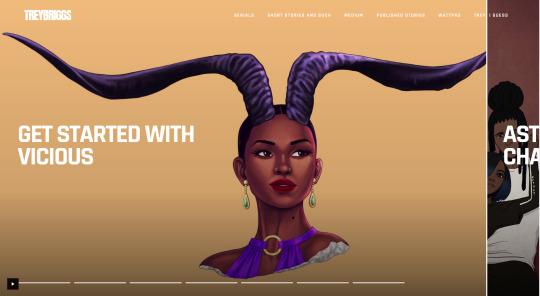
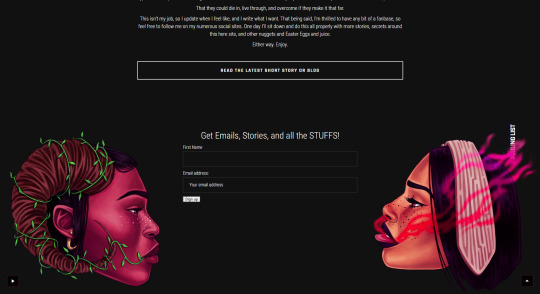
My stories are aimed at black people who want to read dark stories that focus on original black characters that are complex and interesting.
I genuinely believe Black audiences deserve a variety of genres to delve into, and I want to introduce them to paranormal horror, dark romance, and fantasy that they haven’t gotten enough of in the past. I also believe that this can be done across multiple mediums, and I spend my money with black creative professionals to make these experiences extend beyond my words.
For the last two years, I’ve run my stories on sites and Instagram to great reception. I like to craft complex experiences that offer looks at character backgrounds, side and backstories, full websites for each title, and more. I also provide encyclopedias, maps, audio journals, and other ways to get into each world.
During these last few years, I’ve run into a lot of walls, jumped a lot of hurdles, and tried my best. I’ve worked with amazing black artists, voice actors, and actresses, musicians, designers, and more. I trust my ability to run a project, especially when it comes to planning and finding talent.
My overall goal is to run a team of black creatives that crafts novels, graphic novels, audio experiences, and animated series for a dedicated audience.
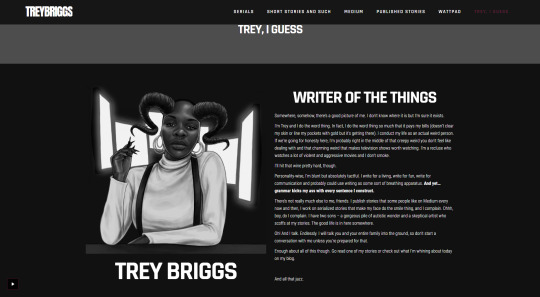
Why I Need Help
Long story short: I have the skill, I have the marketing/website building/business experience, and I have the drive. There’s a lot I can do on my own, but there’s also a lot that gets left behind because I don’t have the money I need to proceed at a steady pace.
I need help with funding so I can focus, hire the right people, and craft these stories the way they deserve to be crafted.
I have thus far spent over $60,000 of my own money on my projects over the past two years - the writing and site-building are easy for me; the rest has to be hired out. I have art, site costs for hosting, domains, templates, specific plugins, and maintenance, audio (and vocal artists to pay), musical, and editing costs.
I’m by no means rich or even particularly financially stable. I have taken on tons of extra clients for my digital marketing business, transcribed hundreds of hours of audio for dirt cheap, and taken out personal loans. I even worked a second full-time job along with my full-time business last year to afford to produce the content I love. It’s starting to take a toll on my mental health.
I plan on continuing to fund these projects out of pocket (and finding ways to do so), but having financial help, however big or small, would allow me to move a lot faster and with less stress. It would let me flesh out ideas and concepts that I have had to scrap because I can only physically handle so much extra work.
I run a full-time marketing business from home, homeschool my autistic 10-year-old, and generally have a busy life. Some of the strain is taking a toll on me, and I don’t want to give up. Having some financial backing could allow me to drop a client or two after a few months and focus on the work I love to do.
How You Can Help
I mainly need a start—a sort of base.
I want to emphasize that I plan to continue to provide the main bulk of funding for my projects. I know my goals are ambitious, and I know each step will take time and money. I welcome any help to make the process smoother and to get around the initial hurdles. I’d like to have ebooks and novels offered on my site by the end of the year (along with the free serials and stories).
Funding means that I can broaden the projects, include more free aspects to my sites, and secure direct financing through sales of ebooks and audiobooks sooner. It also means that I can offer MORE stories, whether they are online only or fully fleshed out novels and sites.
I am swamped with trying to work enough to cover all my bills and creative projects, so I lose a lot of time I could spend plotting and writing. If I have better funding, I can get my stories out quicker (and with fewer mistakes).
The Initial Stories
Let’s talk about my stories! If you’re familiar with my work already, you can skip to the next section.
My main story site is Maybe Trey .
Currently, I have two big titles and a bunch of smaller ones that I am seeking help with funding:
Astrid the Devil
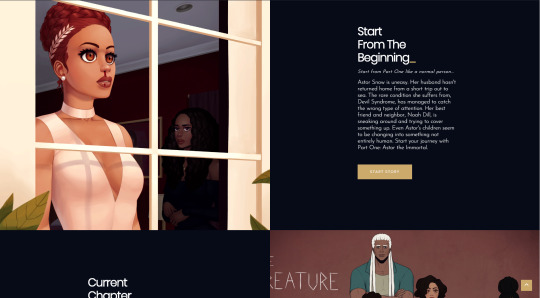
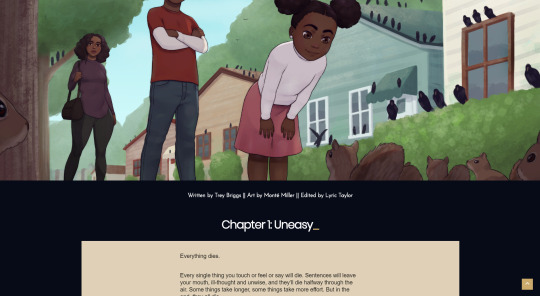
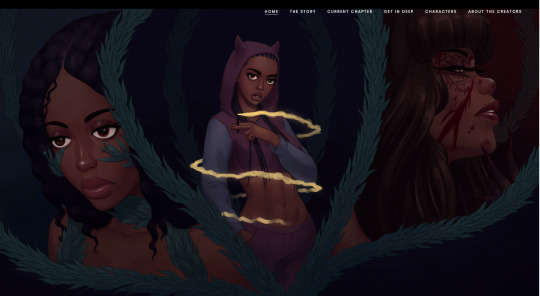

Astrid the Devil is the complicated story of a girl who inherits not only her family’s features and DNA, but their fears, struggles, and fights. It’s the story of a condition called Devil Syndrome, the women who suffer it, and the monsters that devour them. It’s the story of the fight to save the people you love at the expense of innocent lives.
At its core, Astrid the Devil is the story of a woman who inherits the chaos of three generations before her. It’s a look at what is truly passed down to our children, and how they’re left to fight our battles in the aftermath of our failures. It’s the tale of an indescribable monster and the women who struggle to defeat it. It’s a journey into how their every decision could save or destroy an entire world.
Astrid the Devil is the story of Astrid Snow, but her story can’t be told without the story of the women before her.
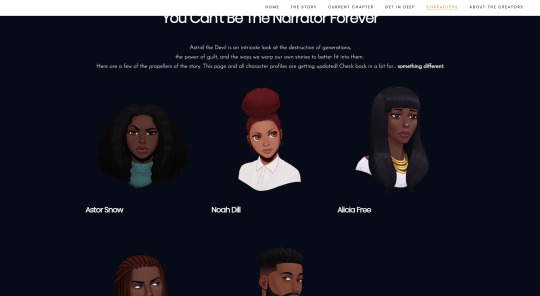
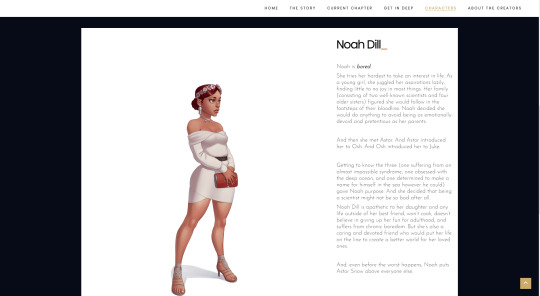
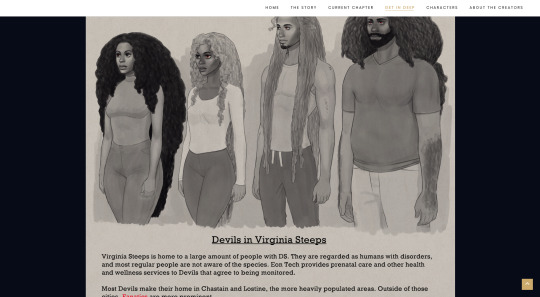
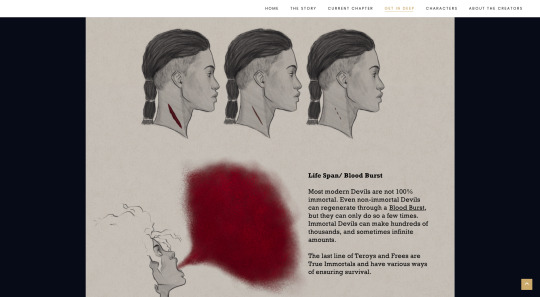
Vicious: On MaybeTrey ��and The Vicious site (in progress)
Somewhere, a war is brewing. That’s the only thing that’s for sure to Junnie Gorton, a young horned girl suffering from a debilitating disease called Horn Rot. She typically dealt with her low survival rate and abnormally large horns by escaping the world with her best friend, Lewish. Now she’s forced to figure out which side is which, save her entire species, and find out the truth behind the sudden uprising in her home.
Horn Rot, a highly contagious and violent disease spreading through horned people, is causing mass amounts of madness and death. Normal horns grow in ways that will pierce, suffocate, and maim their owners, and the only one who can stop it is Junnie’s mother, Lyria. As Lyria falls deeper and deeper into an anti-social revolt, the country reels. While Junnie broods, her entire species must prepare for mass extinction. Her brother plots with a group of people with less than good intentions and Lewish is quieter than usual.
In a civilization brought up on extreme violence and competition, Junnie and Lewish try their best not to get swallowed by their culture, their lives, or their horns.

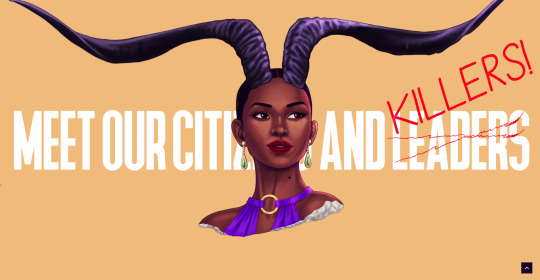
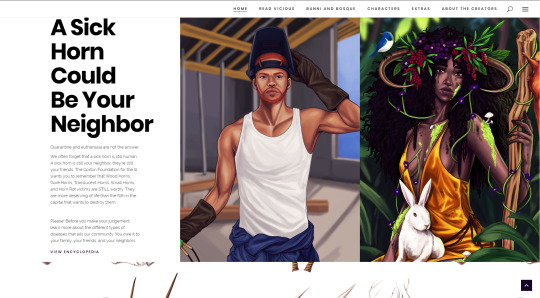
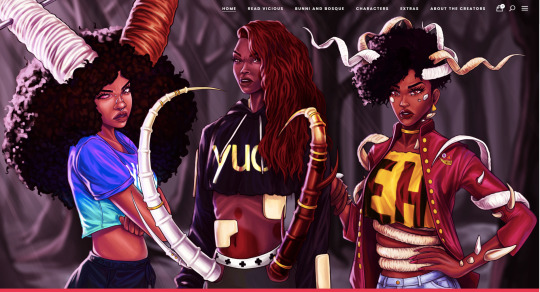
Bunni and Bosque :
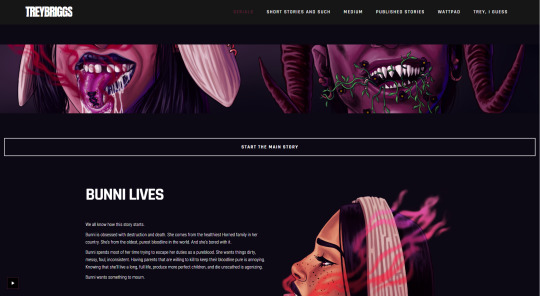
Bunni lives. Bosque dies.
We all know how this story starts.
Bunni is obsessed with destruction and death. She comes from the healthiest Horned family in her country. She’s from the oldest, purest bloodline in the world. And she’s bored with it.
Bunni spends most of her time trying to escape her duties as a pureblood. She wants things dirty, messy, foul, inconsistent. Having parents that are willing to kill to keep their bloodline pure is annoying. Knowing that she’ll live a long, full life, produce more perfect children, and die unscathed is agonizing.
Bunni wants something to mourn.
We all know how this story ends.
Bosque is destined to die an agonizing death, alone on his family’s land. He’s watched everyone he loved and grew up with perish. Sometimes it was because of their disease. Sometimes it was because of the malice and hatred of others.
While he’s absolutely withdrawn and satisfied with his life, Bosque has never had a chance to live it. He spends his days basking in the sun, bathing in wood baths, and contemplating the end.
Bosque isn’t interested in joining the rest of the world. He’d rather die out, alone, where his family belonged.
Bosque wants to go peacefully.
But neither expected to meet each other one day in a supermarket. Neither expected to fall in love, lust, and every vicious and dirty thing between. Neither expected to be so right for each other, all while being wrong for everyone else.
You know the end of this story. Bunni lives, Bosque dies.
But maybe something will change.
My smaller titles, Bunni and Bosque /Aite and Jude, can be found at Maybe Trey .
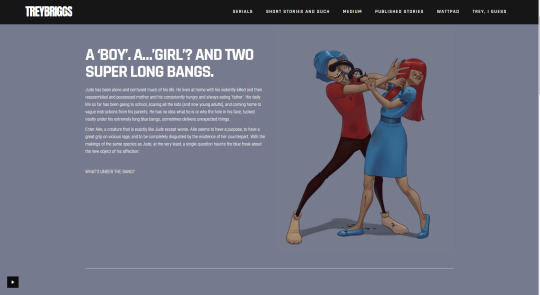
The Business Plan
The initial phase of my business plan is to get the sites populated with ebooks and audiobooks for sale. I also have prints that can be sold. Right now, I am in the audience-building phase while I save up for editing the full novels.
In terms of an actual business with which to publish the stories, I already have a registered publication company in Illinois: Wolfless Studios LLC. I took this step earlier this year with plans to self-publish Astrid and Vicious. So that is paid for and done.
I have also gotten initial editing done on the first six chapters of Astrid, though it will need to be edited from the beginning again once everything is said and done. I’ve spent over $1000 on that so far, and it would go a lot faster if I didn’t need to save up to edit each chapter.
Astrid the Devil is fully plotted, outlined, and only needs the last three chapters. Bunni and Bosque and Vicious are newer, but plotted and already deep into character development (all being shared across social and Wattpad for audience growth). Aite and Jude and other shorts are plotted, and three other unshared stories are plotted and at the editing phase.
Other costs and ways I would use the funding (I would still put in my own money and do as much on my own as possible):
Initial $30K
$6000 - $7000 Line and Copy edits for Astrid (currently at 250000+ words/expecting over 300000 at $0.02 rate)
$6000 - $7000 Line and Copy Edits for Vicious
$3000 - $4000 Line and Copy Edits for Bunni and Bosque
ISBN Purchases (Separate ISBN for each format for each book) - https://www.myidentifiers.com/identify-protect-your-book/barcode
Covers for Astrid/Vicious/B&B Print Versions
Site Hosting Costs and Maintenance for 2 Years
Site completion for all stories
Initial store and app development
40K - Marketing and Graphic Novels
Social, Print, and Web ads
Email Marketing Campaigns
Booths at Decatur Book Festival (depending on COVID)
Social ads and promos
50 to 60 pages
First two chapters offered as free promo with email sign-ups
Audio journals for each character
Situational audio journals
Encyclopedia for Astrid (finishing up)/Vicious
65K - Hires and Next Phases
Ability to hire a Full-Time Editor
Audio Series for each (professionally done)
Vicious Graphic Novel
Additional Title Added
Short animations for both Vicious and Astrid (with plans to fund more with book sales)
Fleshed out Story Sections (Novellas for each character of each series)
Short comic series with Astrid and Vicious side characters
Possible to plan out monthly subscription service with new stories and ‘story package’ deliveries
75K -
Astrid the Devil Graphic Novel
Vicious Graphic Novel
Astrid the Devil Animated Short
Ability to hire part-time Web Developer
Additional bigger title
Anything Over - I ascend into pure light. And also, I can add titles, cover more mediums, and eventually expand my publishing to other black creatives.
From there, I should be able to handle the funding via sales of books, comics, audio, and more. Again, I will always offer mostly free content across the sites.
I believe in proof of concept, and I have diehard fans on my social platforms. With no outside funding, I’ve been able to a lot on my own. I’d love to expand my business into one that does the same for other black authors, artists, voice actors, and animators somewhere down the line.
Thank you so much for your consideration. I appreciate all my readers, present and future, and I appreciate any help!
See incentives and more on the actual campaign: https://www.gofundme.com/f/help-trey-publish-black-paranormal-horror-stories
Thank you so much!
3K notes
·
View notes
Text
Person A: “…Don’t say it.”
Person B: “I wasn’t going to say anything.”
Person A: “Yes you were.”
Person B: “No I wasn’t.”
Person A: “You were going to say, I told you so, I know you were.”
Person B: “Well, now that you mention it~”
469 notes
·
View notes
Text
this is perfect ! i’m writing a major character with one eye, and this made me see a few of my mistakes. be right back, gonna fix them now :)
writing characters with one eye
i can pretty much guarantee that ↑that↑ is not a heading you see everyday.
now i will not be giving advice on writing cyclopses, (though it may be sort of the same thing) i still hope this will be helpful for some people out there that are looking to provide a more diverse cast to their wip!
i have never ever ever read a book, watch a show movie etc etc that involves a character with one eye. (aside from those badass characters who wear eye patches bc they lost sight in one eye in some badass way)
for context: i am one of many people who was born with microphtalmia, an eye disease that results in one or both eyes develope smaller than normal at birth. i myself was born with a smaller left eye, which resulted in my left eye being removed exactly twenty days after birth.
microphthalmia (along with many other eye diseases) typically leads to being half or fully blind. i lucked out and only lost my left eye which i am so so thankful for.
i would really really love to see more representation for my community in literature, especially so people would come to see that being half blind isn’t as unusual and weird as people make it out to be.
without further ado, i present to you, a list of information, facts, and first hand experiences from yours truly!
i’ve had prosthetic eyes made to fit my eye socket for about fifteen years (i’m 16 lol) (the first 6ish months after the surgery i never had a prosthetic)
in my life i’ve had four different prosthetic eyes made because just like other people, my eye socket grew alongside the rest of me, meaning the prosthetic needed to be made bigger
i’ve had my current prosthetic for four years now, the past ones lasted about 2-3 years at a time. this one will probably last me through the rest of my life unless i need/want a new one
as opposed to most media/assumptions, my prosthetic (along with most prosthetics) is PLASTIC (people always think it’s glass) and only half a circle!!
i’ve had three surgeries related to my eye
i do not have depth perception which makes doing certain things very difficult (estimating distance, how close/far i am from something etc)
driving is not affected too much, i just have to turn my head more than other people. i believe being blind in the right eye might be more difficult, but i couldn’t say
doing my make up is kinda easy, except for eyeliner is a pain in the ASS since most people close their eye to do it on their upper lid, but clearly i can’t close my right eye whilst doing it lol
my family as well as my friends and even myself often forget i have a prosthetic, which sometimes results in awkward/funny situations
i hate walking with people on my right bc i can’t tell where they are unless i’m constantly looking down at my/their feet
i sucked at basketball bc i had such a disadvantage (no depth perception, i could only see half the court, i was constantly turning my head) but professional swimming is much easier for me since it’s not a contact sport and doesn’t really require for me to be paying attention to a million things at once
i rarely have to take my prosthetic out, and if i do, it’s either to clean it, (we do get eye crusties on our prosthetics just like other people do when they have pink eye or sever allergies) it’s bothering me/really dry, or i want to take it out to show/scare people lol
a lot of people don’t realize when i first meet them that it’s fake bc my recent prosthetic is amazing accurate to my real eye. others notice and assume i have a lazy eye since it doesn’t move
for some reason people think i can’t cry out of my left (prosthetic) eye??? i still have a tear duct??? i actually think more tears come out of my left tear duct than my right lol
i am extremely self conscious about it, but i know there are other one-eyed beauties out there who aren’t which is amazing!! i try to live vicariously through them lol
i make sooo many jokes about my eye lol, and i’m usually ok w other people making jokes as long as they aren’t like overly rude/offensive, then i’ll feel a lil bad about my self
people never really made fun of it, but kids in middle school likes to wave things in front of my left eye/on my left side that i couldn’t see which got really annoying after a while
getting custom designed prosthetics are available, but they’re really expensive (so are normal lol) they costs thousands of dollars, just like other prosthetics do
i run into things that are on my left side ALL THE TIME it’s actually kinda funny lolol
i try to hide my left eye/turn more to my left side in photos bc my eyes aren’t always looking in the same direction, which really gets to me
i wear glasses for both protection and bc my right eye is -1.75 lmao but i did used to wear non-prescription glasses purely for safety
i do have contacts to wear during the summer, swim meets etc, for when i don’t want/can’t wear my glasses but need to see. bc of this, i have a second pair of glasses that have no prescription
if doctors/scientists managed to figure out a way to fix microphthalmia (a birth defect), or do a sort of eye transplant, i would not be able to have that done to me because all parts of my left eye have been removed from my body
microphthalmia is NOT the only disease that results in the haver losing sight in one or both eyes!! there are many others, but it is not my place to share any experiences for something i have not experienced!!!
for once i just want to see a clumsy character who has one eye that WASNT a result of some tragic event.
so please please please consider including a character with one working eye in your wip. it would mean the world to myself and all the other members of the community (there’s a lot of us, trust me) plus, i wouldn’t mind starting an acting debut playing a half-blind female protagonist, that would be so dope.
that’s about all i can think of for now! please message me or reply to this post if you have any questions, i’m willing to answer any!!! and if you happen to be a member of the one eye club, please add to this post!! that would mean the world to me:)
17K notes
·
View notes
Text
welp
This is what I’ve become. Look what you’ve made me do, you monsters.
Have some legit writing tips from yours truly:
Don’t throw a way an entire writing tool because some doink on writeblr told you to. Learn how and when to use it instead. Yes, this includes clichés and tropes.
Repetitive uses of the word “said” will be noticed, but sometimes you can replace it, often you can leave it out entirely. Personally, I often use “[person] said” to break up dialogue and indicate a pause. It’s also often necessary to show who is speaking, and sometimes that’s more important than how they spoke it.
You don’t always mumble, roar, breathe, scream things, do you? Sometimes you just say them. You just speak. And that’s fine. Let your characters to that too, not everything has to be stuffed with emotion and imagery at all times. In fact, if it is, it will quickly lose meaning as a side effect of its adundance. (This is why I don’t like purple prose.)
“Said” is invisible. This isn’t good, nor is it bad, it’s just a thing. If you need an invisible dialogue tag, use said. If you need something flashier, don’t use said. Easy-peasy.
Part of being a writer is knowing what words to use and when. Shocking, right?
If you replace all dialogue tags with entire paragraphs of description, it’ll massively slow down your dialogue. It will also indicate pauses in dialogue to the reader, so unless your characters are taking their sweet time to answer for whatever reason, keeping that shit at a rapid pace will make it read as more natural.
Dialogue is probably the easiest way to show how characters relate and react to each other. By focusing on their appearances or surroundings, you will take the focus away from what they’re actually saying.
Example: You don’t watch your friend brush their hair for a solid minute before you respond to their question, right? If you describe a character brushing their hair before your protag responds, that’s what it’ll read as, so know when to describe and when not to.
Sometimes you genuinely don’t know what to answer, though. If your character describes something in detail in the middle of a conversation, it could indicate that they aren’t quite “there” and are distracted. If they instead start an internal monologue, it could mean that they’re thinking hard about their answer before responding.
Also, if you’ve properly established a character as, for example, having anger issues, showing us how his veins pop and he throws his arms around while screaming every time he gets angry will do nothing and give us no new information. Telling us he was pissed will be enough to know how he expresses it. If the reader has enough background info already, they’ll be able to interpret how the character is saying something just based on what they’re saying.
Show don’t tell is good, but it’s not a law and will never be. Sometimes you have to tell things. If you wanted to show people your story, you’d just draw it or make a comic, right? But you’re not, you’re writing. You can’t avoid telling, because you’re telling a story.
Show don’t tell is often misinterpreted by writers as “use four paragraphs when five words would convey the same information”. Using more words to describe something indicates that it’s important, because you draw the reader’s attention to it by using up their time on this description.
Example: If you describe a character’s death with the same amount of words as you describe another character sitting down on a chair, either that death won’t be quite as impactful, or that’s a really intense chair.
Wikipedia’s article on Show Don’t Tell: “The goal is not to drown the reader in heavy-handed adjectives, but rather to allow readers to interpret significant details in the text.” Significant details. Meaning: try not to waste your showing on shit that doesn’t matter in the grand scheme of things. Because when you show actually important things, they won’t be seen as quite as important, because everything else so far has been described the same way.
People read because their imagination does half the job for them. Don’t remove that aspect from your writing by describing things that may not need to be described. Sometimes what we don’t see is what’s more interesting. Let the audience fill in the blanks.
Nothing is off-limits. Nothing is “wrong”. Writing is an art. Learning how and when to use specific tools and words, understanding their effects and how they work together, is what will make you a stronger writer.
2K notes
·
View notes
Text
Writing x Characters When You Aren’t x, A Masterlist
x: a variable used to represent something unknown.
We’ve seen an influx of questions about how to write stories based around characters of color, disability, non-binary, etc. when the author does not fall into these categories. Rather than have these posts take over the site, we’ve decided to compile a list of resources to help our fellow writers become more educated about writing what they do not immediately know. However, this list is not the end-all-be-all of knowledge; one should always try to learn from someone with first hand experience in any topic. The world is constantly growing and changing, and because of that, there will always be more to learn. The admins at Plotline Hotline want to help writers form respectful, informed, and realistic characters that broaden the narrow range we see in literature today.
*Be wary that some of the topics listed below contain sensitive material. Reader discretion is advised.*
As always, the links I found to be especially apt will be in bold. Topics are listed alphabetically, excepting the “other” section.
Culture
Appropriate Cultural Appropriation
What is Cultural Appropriation? [1,2,3]
Cultural Appropriation Is, In Fact, Indefensible
Voice Appropriation & Writing About Other Cultures
Diversity, Appropriation, and Writing the Other [List]
Disability
Writing Disibilities [1,2,3,4,5]
Guides to Writing Deaf or Hard of Hearding People
National Association of the Deaf - Resources [List]
World Federation of the Deaf
Using a Prosthetic Device
Prostehtic Limbs (Character Guide)
How NOT to Write Disabled Characters
A Guide to Disibility Rights Law (United States)
Timeline of Disibility Rights in the United States
Social Security Disability: List of Impairments, Medical Conditions, and Problems [List] (United States)
How to Write Disabled Characters: An Opinion Piece
Artificial Eye Resources [List][Various]
Adapting to the Loss of an Eye
Misconceptions and Myths About Blindness
Blind Characters: A Process of Awareness
Writing Blind Characters [List]
Types of Learning Disabilities [List]
Diversity
A Guide to Spotting and Growing Past Stereotypes
How to Prepare to Write a Diverse Book
The Diversity of Writing
Why Diversity Matters for Everyone
Writing a Driverse Book [1,2,3,4,5]
Diversity, Political Correctness and The Power of Language
Diversity Book List [List][Books]
Basic Tips To Write Subcultures & Minority Religions Better
Basic Tips to Avoid Tokenism
Gender
GLAAD Media Reference Guide - Transgender
Creating Well-Written Trans Characters
A Few Things Writers Need To Know About Sexuality & Gender Expression
Trans (Character Guide & Bio Building)
A Non-Binary Person’s Guide to Invented Pronouns
Gender Neutral Writing [List]
Keeping a Trans* Person a Person
Suggestions for Reducing Gendered Terms in Language [Photo]
How to Review a Trans Book as a Cis Person
Writing Characters of Different Genders [List]
Understanding Gender
Gender Spectrum Resources [List]
Gender History
Illness
Writing Chronic Illness [1,2]
The Spoon Theory - Also pertains to disibility
About HIV/AIDS
Sexually Transmitted Diseases [List]
Sexually Transmitted Infections
Sex and Gender Differences in Health [Study]
All Chronic Illness Topics [List]
Coping with Chronic Illness
All Cancer Types
A Day in the Life of a Home Health Aide/Health Coach
Fiction Books With Chronically Ill Main Characters- Not Cancer [List][Books]
Neurotype (Including Mental Health)
Writing an Autistic Character When You Don’t Have Autism
Depression Resources [List]
What to Consider When Writing Mental Illness
Stanford Psychiatric Patient Care
Inpatient Psychiatric Questions and Tips
Don’t Call Me Crazy [Documentary]
(Avoid) Romanticizing Mental Illness [1,2]
A Day in the Life of a Mental Hospital Patient
State-run vs. Private Mental Hospitals
Mental Disorders
Mental Hospital Non-Fiction [List][Books]
National Institute of Mental Health - Mental Health Information [List]
Writing Autistic
What Causes PTSD?
Remember, Remember: The Basics of Writing Amnesia
ADHD Basic Information
What is a Learning Disability?
What is Neurotypical?
Race
Writing Race: A Checklist for Authors
Transracial Writing for the Sincere
Is my character “black enough”
White Privilege: Unpacking the Invisible Knapsack
Challenge, Counter, Controvert: Subverting Expectations
Writing With Color: Blogs - Recs - Resources [List]
Writing People of Color (If you happen to be a person of another color)
7 Offensive Mistakes Well-Intentioned Writers Make
Description Guide - Words for Skin Tone
Religion
Religion in Novels: Terrific or Taboo?
How to Write a Fantasy Novel that Sells: The Religion
Writing About Faith And Religion
From Aladdin to Homeland: How Hollywood Can Reinforce Racial and Religious Stereotypes
Sexuality
Understanding Sexual Orientation and Gender Identity [List]
Writing Gay Characters [1,2,3]
American Civil Liberties Union - LGBT+ Rights
LGBT+ Rights by Country or Territory
History of Gay Rights
Gay Rights Movement
LGBT+ Culture
Gay Myths and Stereotypes
LGBT+ Studies Web Sites [List]
LGBTQ Youth Issues
LGBTData.com
Overview of Gay and Lesbian Parenting, Adoption and Foster Care (United States)
Other
How Doctors’ Offices—and Queer Culture—Are Failing Autistic LGBTQ People
Five Traps and Tips for Character Development
Developing Realistic Characters
I hope that this list will provide topics a writer may not initially think to research when writing. If there are any resources that you think would be fitting for this list, please let us know! We want to have as many helpful sources as possible to maximize learning opportunities.
Stay educated,
xx Sarah
57K notes
·
View notes
Text
Ways to un-stick a stuck story
Do an outline, whatever way works best. Get yourself out of the word soup and know where the story is headed.
Conflicts and obstacles. Hurt the protagonist, put things in their way, this keeps the story interesting. An easy journey makes the story boring and boring is hard to write.
Change the POV. Sometimes all it takes to untangle a knotted story is to look at it through different eyes, be it through the sidekick, the antagonist, a minor character, whatever.
Know the characters. You can’t write a story if the characters are strangers to you. Know their likes, dislikes, fears, and most importantly, their motivation. This makes the path clearer.
Fill in holes. Writing doesn’t have to be linear; you can always go back and fill in plotholes, and add content and context.
Have flashbacks, hallucinations, dream sequences or foreshadowing events. These stir the story up, deviations from the expected course add a feeling of urgency and uncertainty to the narrative.
Introduce a new mystery. If there’s something that just doesn’t add up, a big question mark, the story becomes more compelling. Beware: this can also cause you to sink further into the mire.
Take something from your protagonist. A weapon, asset, ally or loved one. Force him to operate without it, it can reinvigorate a stale story.
Twists and betrayal. Maybe someone isn’t who they say they are or the protagonist is betrayed by someone he thought he could trust. This can shake the story up and get it rolling again.
Secrets. If someone has a deep, dark secret that they’re forced to lie about, it’s a good way to stir up some fresh conflict. New lies to cover up the old ones, the secret being revealed, and all the resulting chaos.
Kill someone. Make a character death that is productive to the plot, but not “just because”. If done well, it affects all the characters, stirs up the story and gets it moving.
Ill-advised character actions. Tension is created when a character we love does something we hate. Identify the thing the readers don’t want to happen, then engineer it so it happens worse than they imagined.
Create cliff-hangers. Keep the readers’ attention by putting the characters into new problems and make them wait for you to write your way out of it. This challenge can really bring out your creativity.
Raise the stakes. Make the consequences of failure worse, make the journey harder. Suddenly the protagonist’s goal is more than he expected, or he has to make an important choice.
Make the hero active. You can’t always wait for external influences on the characters, sometimes you have to make the hero take actions himself. Not necessarily to be successful, but active and complicit in the narrative.
Different threat levels. Make the conflicts on a physical level (“I’m about to be killed by a demon”), an emotional level (“But that demon was my true love”) and a philosophical level (“If I’m forced to kill my true love before they kill me, how can love ever succeed in the face of evil?”).
Figure out an ending. If you know where the story is going to end, it helps get the ball rolling towards that end, even if it’s not the same ending that you actually end up writing.
What if? What if the hero kills the antagonist now, gets captured, or goes insane? When you write down different questions like these, the answer to how to continue the story will present itself.
Start fresh or skip ahead. Delete the last five thousand words and try again. It’s terrifying at first, but frees you up for a fresh start to find a proper path. Or you can skip the part that’s putting you on edge – forget about that fidgety crap, you can do it later – and write the next scene. Whatever was in-between will come with time.
135K notes
·
View notes
Text
always gonna reblog this
since the old version of this post was flagged for 'adult content'...
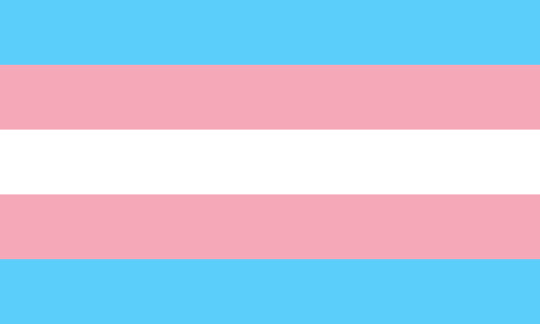
reblog this post if your account is a trans safe space or owned by a trans person!
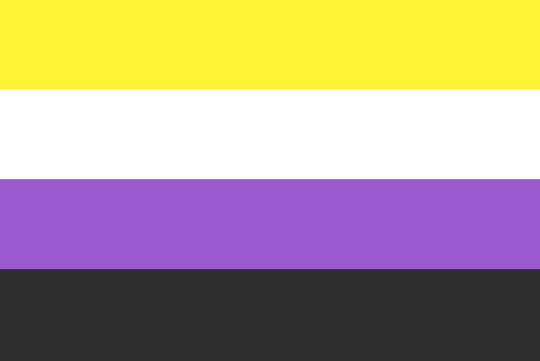
along with that, reblog if your account is a trans non-binary spectrum safe space or owned by someone on the trans enby spectrum!
163K notes
·
View notes
Text
Resources For Describing Emotion
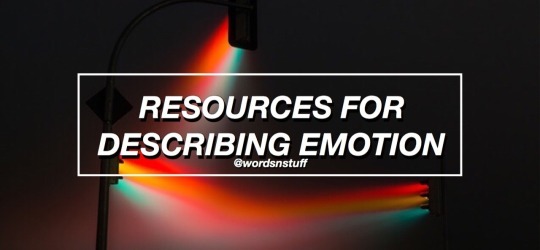
Emotions
Without Making Your Character Feel Too Self Aware
Showing Emotion Without Telling About It
Emotions Associated With Body Language
Telling Readers What The Character Doesn’t Want To Show
Hiding Emotions
Expressing Cardinal Emotions: Masculine vs. Feminine
Writing Extreme Emotion Without Melodrama
Specific Emotions
Conveying Shock
Conveying Embarrassment
Conveying Disappointment
Conveying Love/Attraction
Conveying Annoyance
Conveying Relief
Conveying Uncertainty
Conveying Impatience
Conveying Shame
Conveying Resentment
Conveying Panic
Conveying Guilt
Conveying Desperation
Conveying Sarcasm & Verbal Disrespect
Conveying Confusion
Conveying Stubbornness
Conveying Frustration
Conveying Indifference
Conveying Indignation
Conveying Confidence & Pride
Conveying Smugness
Conveying Enthusiasm
Conveying Curiosity
Conveying Hopefulness
Conveying Unease
Conveying Reluctance
Conveying Worry
Conveying Humility & Meekness
Conveying Happiness & Joy
Conveying Amusement
Conveying Disgust
Conveying Resignation
Conveying Jealousy
Conveying Anticipation
Conveying Contentment
Conveying Defeat
Conveying Excitement
Conveying Fear
Conveying Hatred
Conveying Hurt
Conveying Being Overwhelmed
Conveying Sadness & Grief
Conveying Satisfaction
Conveying Somberness
Conveying Sympathy & Empathy
Conveying Wariness
Conveying Defensiveness
Conveying Desire
Conveying Doubt
Conveying Energy
Conveying Exhaustion
Conveying Hunger
Conveying Loneliness
Conveying Physical Pain
Emotional Wounds
A Role Model Who Disappoints
A Sibling’s Betrayal
A Speech Impediment
Becoming a Caregiver at an Early Age
Being Bullied
Being Fired or Laid Off
Being Held Captive
Being Mugged
Being Publicly Humiliated
Being Raised by Neglectful Parents
Being Raised by Overprotective Parents
Being So Beautiful It’s All People See
Being the Victim of a Vicious Rumor
Being Stalked
Being Trapped in a Collapsed Building
Being Unfairly Blamed For The Death of Another
Childhood Sexual Abuse (by a family member or known person)
Discovering One’s Parent is a Monster
Discovering One’s Sibling was Abused
Experiencing a Miscarriage or Stillbirth
Failing At School
Failing To Do The Right Thing
Financial Ruin Due To A Spouse’s Irresponsibility
Finding Out One’s Child Was Abused
Finding Out One Was Adopted
Getting Lost In a Natural Environment
Growing Up In A Cult
Growing Up in a Dangerous Neighborhood
Growing Up In Foster Care
Growing Up In The Public Eye
Growing Up In The Shadow of a Successful Sibling
Growing Up with a Sibling Who Has a Chronic Disability or Illness
Having Parents Who Favored One Child Over Another
Having To Kill Another Person To Survive
Infertility
Infidelity (emotional or physical)
Losing a Limb
Losing a Loved One To A Random Act of Violence
Making a Very Public Mistake
Overly Critical or Strict Parents
Physical Disfigurement
Rejection By One’s Peers
Telling The Truth But Not Being Believed
The Death of a Child On One’s Watch
Victimization via Identity Theft
Watching A Loved One Die
Wrongful Imprisonment
Spending Time In Jail
Suffering From a Learning Disability
Motivation
Achieving Spiritual Enlightenment
Avoiding Certain Death
Avoiding Financial Ruin
Beating a Diagnosis or Condition
Being Acknowledged and Appreciated by Family
Being a Leader of Others
Being the Best At Something
Caring for an Aging Parent
Carrying on a Legacy
Catching The Bad Guy or Girl
Coming To Grips With Mental Illness
Discovering One’s True Self
Escaping a Dangerous Life one Doesn’t Want
Escaping a Killer
Escaping a Widespread Disaster
Escaping Confinement
Escaping Homelessness
Escaping Invaders
Finding Friendship or Companionship
Finding a Lifelong Partner
Having a Child
Helping a Loved One See They Are Hurting Themselves and Others
Obtaining Shelter From The Elements
Overcoming Abuse and Learning To Trust
Overcoming Addiction
Protecting One’s Home or Property
Pursuing Justice For Oneself or Others
Realizing a Dream
Reconciling with an Estranged Family Member
Rescuing a Loved One From a Captor
Restoring A Name or Reputation
Righting a Deep Wrong
Seeking Out One’s Biological Roots
Stopping an Event From Happening
Trying Again When One Has Previously Failed
Support Wordsnstuff!
Request A Writing Help Post/Themed Playlist/Writing Tips!
Send Me Poetry To Feature On Our Instagram!
Receive Updates & Participate In Polls On Our Twitter!
Like us and share on Facebook!
Read More On Our Masterlist & See our Frequently Asked Questions!
Tag What You Want Me To See With #wordsnstuff!
Participate in monthly writing challenges!
107K notes
·
View notes
Text
reblogging for my followers because this is gold
Helpful things for action writers to remember
Sticking a landing will royally fuck up your joints and possibly shatter your ankles, depending on how high you’re jumping/falling from. There’s a very good reason free-runners dive and roll.
Hand-to-hand fights usually only last a matter of seconds, sometimes a few minutes. It’s exhausting work and unless you have a lot of training and history with hand-to-hand combat, you’re going to tire out really fast.
Arrows are very effective and you can’t just yank them out without doing a lot of damage. Most of the time the head of the arrow will break off inside the body if you try pulling it out, and arrows are built to pierce deep. An arrow wound demands medical attention.
Throwing your opponent across the room is really not all that smart. You’re giving them the chance to get up and run away. Unless you’re trying to put distance between you so you can shoot them or something, don’t throw them.
Everyone has something called a “flinch response” when they fight. This is pretty much the brain’s way of telling you “get the fuck out of here or we’re gonna die.” Experienced fighters have trained to suppress this. Think about how long your character has been fighting. A character in a fist fight for the first time is going to take a few hits before their survival instinct kicks in and they start hitting back. A character in a fist fight for the eighth time that week is going to respond a little differently.
ADRENALINE WORKS AGAINST YOU WHEN YOU FIGHT. THIS IS IMPORTANT. A lot of times people think that adrenaline will kick in and give you some badass fighting skills, but it’s actually the opposite. Adrenaline is what tires you out in a battle and it also affects the fighter’s efficacy - meaning it makes them shaky and inaccurate, and overall they lose about 60% of their fighting skill because their brain is focusing on not dying. Adrenaline keeps you alive, it doesn’t give you the skill to pull off a perfect roundhouse kick to the opponent’s face.
Swords WILL bend or break if you hit something hard enough. They also dull easily and take a lot of maintenance. In reality, someone who fights with a sword would have to have to repair or replace it constantly.
Fights get messy. There’s blood and sweat everywhere, and that will make it hard to hold your weapon or get a good grip on someone.
A serious battle also smells horrible. There’s lots of sweat, but also the smell of urine and feces. After someone dies, their bowels and bladder empty. There might also be some questionable things on the ground which can be very psychologically traumatizing. Remember to think about all of the character’s senses when they’re in a fight. Everything WILL affect them in some way.
If your sword is sharpened down to a fine edge, the rest of the blade can’t go through the cut you make. You’ll just end up putting a tiny, shallow scratch in the surface of whatever you strike, and you could probably break your sword.
ARCHERS ARE STRONG TOO. Have you ever drawn a bow? It takes a lot of strength, especially when you’re shooting a bow with a higher draw weight. Draw weight basically means “the amount of force you have to use to pull this sucker back enough to fire it.” To give you an idea of how that works, here’s a helpful link to tell you about finding bow sizes and draw weights for your characters. (CLICK ME)
If an archer has to use a bow they’re not used to, it will probably throw them off a little until they’ve done a few practice shots with it and figured out its draw weight and stability.
People bleed. If they get punched in the face, they’ll probably get a bloody nose. If they get stabbed or cut somehow, they’ll bleed accordingly. And if they’ve been fighting for a while, they’ve got a LOT of blood rushing around to provide them with oxygen. They’re going to bleed a lot.
Here’s a link to a chart to show you how much blood a person can lose without dying. (CLICK ME)
If you want a more in-depth medical chart, try this one. (CLICK ME)
Hopefully this helps someone out there. If you reblog, feel free to add more tips for writers or correct anything I’ve gotten wrong here.
245K notes
·
View notes
